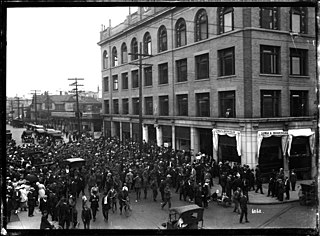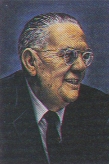Related Research Articles

The National Labor Relations Act of 1935, also known as the Wagner Act, is a foundational statute of United States labor law that guarantees the right of private sector employees to organize into trade unions, engage in collective bargaining, and take collective action such as strikes. Central to the act was a ban on company unions. The act was written by Senator Robert F. Wagner, passed by the 74th United States Congress, and signed into law by President Franklin D. Roosevelt.

The Labor Management Relations Act of 1947, better known as the Taft–Hartley Act, is a United States federal law that restricts the activities and power of labor unions. It was enacted by the 80th United States Congress over the veto of President Harry S. Truman, becoming law on June 23, 1947.
Industrial relations or employment relations is the multidisciplinary academic field that studies the employment relationship; that is, the complex interrelations between employers and employees, labor/trade unions, employer organizations, and the state.
Collective bargaining is a process of negotiation between employers and a group of employees aimed at agreements to regulate working salaries, working conditions, benefits, and other aspects of workers' compensation and rights for workers. The interests of the employees are commonly presented by representatives of a trade union to which the employees belong. A collective agreement reached by these negotiations functions as a labour contract between an employer and one or more unions, and typically establishes terms regarding wage scales, working hours, training, health and safety, overtime, grievance mechanisms, and rights to participate in workplace or company affairs. Such agreements can also include 'productivity bargaining' in which workers agree to changes to working practices in return for higher pay or greater job security.
The League of Resident Theatres (LORT) is the largest professional theater association of its kind in the United States, with 75 member theaters located in every major market in the U.S., including 29 states and the District of Columbia. LORT members collectively issue more Equity contracts to actors than Broadway and commercial tours combined.
The Graduate Student Organizing Committee (GSOC) is a labor union representing graduate teaching and research assistants at New York University (NYU).
Graduate student employee unionization, or academic student employee unionization, refers to labor unions that represent students who are employed by their college or university to teach classes, conduct research and perform clerical duties. As of 2014, there are at least 33 US graduate employee unions, 18 unrecognized unions in the United States, and 23 graduate employee unions in Canada. By 2019, it is estimated that there were 83,050 unionized student employees in certified bargaining units in the United States. Prior to the 2,000s almost all US graduate employee unions are located in public universities, most of which formed during the 1990s. However, that is no longer true today with many private universities now being organized. In 2014, New York University's Graduate Student Organizing Committee, affiliated with the United Automobile Workers (UAW), became the first graduate employee union recognized by a private university in the US. In September 2018, Brandeis University became the second private university to negotiate a collective bargaining agreement for graduate student employees, followed by Tufts University in October 2018 and Harvard in July 2020. American University and New School were in the process of negotiating an agreement as of September 2018. Many of these unions refer to their workers as Academic Student Employees (ASEs) to reflect the fact that their membership may also include undergraduate students working in represented job classifications. In 2019, the National Labor Relations Board (NLRB) proposed a new rule that said graduate students are not employees, which could affect unionization efforts at private universities, although the final rule has yet to be published.

Retail, Wholesale and Department Store Union (RWDSU) is a labor union in the United States. Founded in 1937, the RWDSU represents about 60,000 workers in a wide range of industries, including but not limited to retail, grocery stores, poultry processing, dairy processing, cereal processing, soda bottlers, bakeries, health care, hotels, manufacturing, public sector workers like crossing guards, sanitation, and highway workers, warehouses, building services, and distribution.
Jesse Simons was an American labor arbitrator, who helped set in place a system of collective bargaining between New York City (NYC) and its employees.
An employers' organization or employers' association is a collective organization of manufacturers, retailers, or other employers of wage labor. Employers' organizations seek to coordinate the behavior of their member companies in matters of mutual interest, such as during negotiations with trade unions or government bodies. Employers' organizations operate like trade unions and promote the economic and social interests of its member organisations.

Labor relations is a field of study that can have different meanings depending on the context in which it is used. In an international context, it is a subfield of labor history that studies the human relations with regard to work in its broadest sense and how this connects to questions of social inequality. It explicitly encompasses unregulated, historical, and non-Western forms of labor. Here, labor relations define "for or with whom one works and under what rules. These rules determine the type of work, type and amount of remuneration, working hours, degrees of physical and psychological strain, as well as the degree of freedom and autonomy associated with the work." More specifically in a North American and strictly modern context, labor relations is the study and practice of managing unionized employment situations. In academia, labor relations is frequently a sub-area within industrial relations, though scholars from many disciplines including economics, sociology, history, law, and political science also study labor unions and labor movements. In practice, labor relations is frequently a subarea within human resource management. Courses in labor relations typically cover labor history, labor law, union organizing, bargaining, contract administration, and important contemporary topics.
Brown v. Hotel and Restaurant Employees, 468 U.S. 491 (1984), is a 4-to-3 ruling by the United States Supreme Court which held that a New Jersey state gaming law requiring union leaders to be of good moral character was not preempted by the National Labor Relations Act (NLRA).

George W. Taylor was a professor of industrial relations at the Wharton School at the University of Pennsylvania, and is credited with founding the academic field of study known as industrial relations. He served in several capacities in the federal government, most notably as a mediator and arbitrator. During his career, Taylor settled more than 2,000 strikes.
A collective agreement, collective labour agreement (CLA) or collective bargaining agreement (CBA) is a written contract negotiated through collective bargaining for employees by one or more trade unions with the management of a company that regulates the terms and conditions of employees at work. This includes regulating the wages, benefits, and duties of the employees and the duties and responsibilities of the employer or employers and often includes rules for a dispute resolution process.

The Blue Eagle at Work: Reclaiming Democratic Rights in the American Workplace is a legal treatise written by Charles J. Morris which analyzes collective bargaining under the National Labor Relations Act (NLRA), the federal statute governing most private sector labor relations in the United States. Published in 2005 by Cornell University Press, the text claims that the NLRA guarantees that employees under that Act have the right to bargain collectively through minority unions—but only on a members-only basis—in workplaces where there is not an established majority union, notwithstanding that the present practice and general understanding of the law is that only majority-union employees are entitled to engage in collective bargaining on an exclusivity basis. Contracts resulting from such minority-union bargaining would apply to union members only, not to other employees.
The National Football League Management Council is a non-profit association of clubs in the National Football League (NFL) that represents its members in negotiations related to the Collective Bargaining Agreement with the NFL Players Association. It is based in New York City and its chairman is the NFL Executive Vice President of Labor Relations, Harold Henderson.
Communications Workers of America v. Beck, 487 U.S. 735 (1988), is a decision by the United States Supreme Court which held that, in a union security agreement, unions are authorized by statute to collect from non-members only those fees and dues necessary to perform its duties as a collective bargaining representative. The rights identified by the Court in Communications Workers of America v. Beck have since come to be known as "Beck rights," and defining what Beck rights are and how a union must fulfill its duties regarding them is an active area of modern United States labor law.
A public-sector trade union is a trade union which primarily represents the interests of employees within public sector or governmental organizations.
A master contract or master agreement is a collective bargaining agreement which covers all unionized worksites in an industry, market or company, and which establishes the terms and conditions of employment common to all workers in the industry, market or company.
A public-sector trade union is a trade union which primarily represents the interests of employees within public sector or governmental organizations.